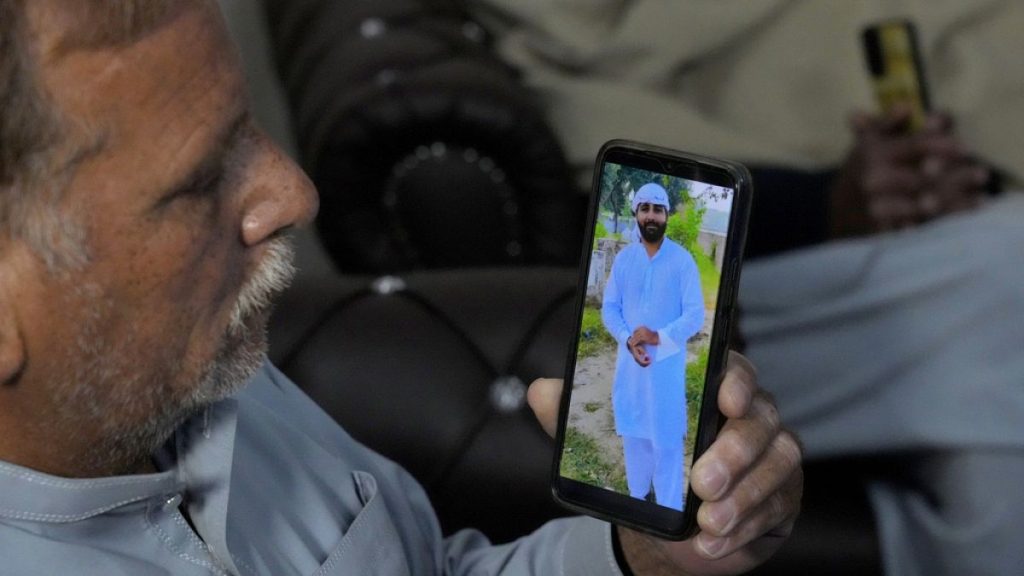The perilous journey of migrants seeking refuge or better opportunities in Europe continues to claim lives, with a recent tragedy off the West African coast highlighting the desperate measures taken and the devastating consequences. A boat carrying approximately 80 migrants, primarily from Pakistan, capsized near Dakhla, a Moroccan-controlled port city in Western Sahara. The incident, which occurred after the boat departed from Mauritania, resulted in the deaths of at least 50 individuals, with 44 identified as Pakistani nationals. This tragedy underscores the increasing use of dangerous routes as authorities tighten security measures in traditional migration corridors, forcing vulnerable individuals to embark on even more precarious journeys.
The majority of the Pakistani victims hailed from the eastern Punjab province, leaving behind grieving families and communities grappling with the immense loss. Heartbreaking accounts from relatives paint a picture of desperation and the exploitation of migrants by human traffickers. Ahsan Shehzad, a resident of Dhola village, recounted receiving a final voice message from his son, Sufyan Ali, describing the overcrowded conditions on the ill-fated vessel, moments before it capsized. Another father, Muhammad Akram, revealed he had paid a substantial sum to a human trafficker to send his son abroad, unaware of the perilous sea journey that awaited him. These stories highlight the immense financial and emotional sacrifices made by families in the hope of a better future for their loved ones, often ending in tragedy.
The lure of economic opportunity and a better life drives many to risk their lives on these treacherous journeys. Families have been forced to sell their possessions to afford the exorbitant fees demanded by human traffickers, highlighting the economic desperation fueling this dangerous migration. The mother of Arslan Ahmed, who embarked on the journey with his friend Mohammad Arfan, shared her anguish, clinging to the hope that her son survived the capsizing, despite the lack of direct contact. Razia Bibi, Arfan’s mother, pleaded with authorities to locate her son and bring him home, a sentiment echoed by many families desperately seeking information about their missing loved ones. These personal accounts underscore the human cost of this ongoing crisis.
While millions migrate to Europe legally each year, a smaller but significant number resort to irregular and dangerous routes, driven by factors such as conflict, poverty, and lack of legal pathways. The route from West Africa to the Canary Islands has become increasingly popular, and tragically, increasingly deadly. Frontex, the European Union’s border agency, documented over 50,000 migrants making this journey in 2024, a stark indicator of the shift in migration patterns. The migrant rights group, Walking Borders, has labelled this route the “deadliest in the world,” reporting nearly 10,000 deaths or disappearances in recent years. The inherent risks are exacerbated by the long distances travelled, often to circumvent security patrols, further endangering the lives of those on board.
The Canary Islands, situated approximately 105 kilometers from the closest point in Africa, represent a beacon of hope for many migrants. However, the journey often involves departing from further afield, such as Mauritania, which is over 700 kilometers from the nearest Canary Island. This longer route increases the likelihood of encountering perilous conditions at sea, making rescue efforts even more challenging. The overcrowded boats used by traffickers are often unsuitable for such journeys, lacking basic safety equipment and increasing the vulnerability of passengers.
The tragic incident has prompted responses from both Pakistan and the international community. Pakistan’s President and Prime Minister expressed their grief and emphasized the need for stricter measures against human trafficking. The Pakistani Foreign Ministry confirmed that survivors, including some Pakistanis, were being sheltered in a camp near Dakhla, and that the Pakistani Embassy in Morocco was working with local authorities to provide assistance. While the exact number of Pakistani casualties remains unconfirmed, the tragedy highlights the ongoing challenges in combating human trafficking networks and the urgent need for comprehensive solutions to address the root causes of irregular migration. This incident is sadly not an isolated event; hundreds of Pakistanis perish each year attempting similar journeys, underscoring the ongoing human cost of this crisis. The international community faces the complex task of balancing border security with the humanitarian imperative to protect vulnerable migrants. A multi-pronged approach is required, involving enhanced international cooperation, addressing the root causes of migration, and creating safe and legal pathways for those seeking a better life.














